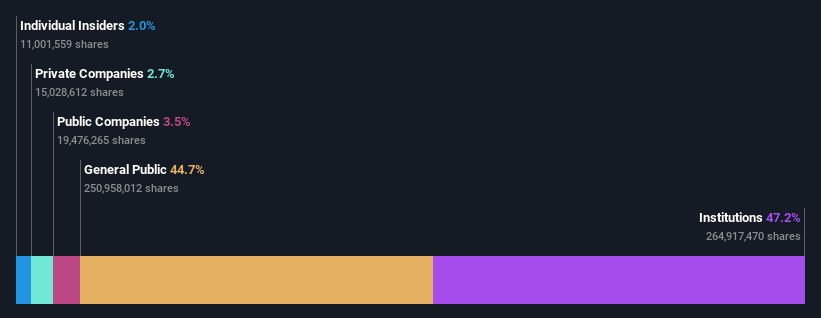Institutional investors have a lot riding on NexGen Energy Ltd. (TSE:NXE) with 47% ownership
Key Insights
Institutions' substantial holdings in NexGen Energy implies that they have significant influence over the company's share price
39% of the business is held by the top 25 shareholders
If you want to know who really controls NexGen Energy Ltd. (TSE:NXE), then you'll have to look at the makeup of its share registry. We can see that institutions own the lion's share in the company with 47% ownership. Put another way, the group faces the maximum upside potential (or downside risk).
And things are looking up for institutional investors after the company gained CA$180m in market cap last week. The gains from last week would have further boosted the one-year return to shareholders which currently stand at 53%.
Let's take a closer look to see what the different types of shareholders can tell us about NexGen Energy.
See our latest analysis for NexGen Energy
What Does The Institutional Ownership Tell Us About NexGen Energy?
Many institutions measure their performance against an index that approximates the local market. So they usually pay more attention to companies that are included in major indices.
NexGen Energy already has institutions on the share registry. Indeed, they own a respectable stake in the company. This can indicate that the company has a certain degree of credibility in the investment community. However, it is best to be wary of relying on the supposed validation that comes with institutional investors. They too, get it wrong sometimes. When multiple institutions own a stock, there's always a risk that they are in a 'crowded trade'. When such a trade goes wrong, multiple parties may compete to sell stock fast. This risk is higher in a company without a history of growth. You can see NexGen Energy's historic earnings and revenue below, but keep in mind there's always more to the story.
Hedge funds don't have many shares in NexGen Energy. L1 Capital Pty. Limited is currently the company's largest shareholder with 4.3% of shares outstanding. The second and third largest shareholders are Mega Uranium Ltd. and Mirae Asset Global Investments Co., Ltd., with an equal amount of shares to their name at 3.5%. Furthermore, CEO Leigh Curyer is the owner of 0.9% of the company's shares.
On studying our ownership data, we found that 25 of the top shareholders collectively own less than 50% of the share register, implying that no single individual has a majority interest.
While studying institutional ownership for a company can add value to your research, it is also a good practice to research analyst recommendations to get a deeper understand of a stock's expected performance. There are plenty of analysts covering the stock, so it might be worth seeing what they are forecasting, too.
Insider Ownership Of NexGen Energy
The definition of company insiders can be subjective and does vary between jurisdictions. Our data reflects individual insiders, capturing board members at the very least. Management ultimately answers to the board. However, it is not uncommon for managers to be executive board members, especially if they are a founder or the CEO.
I generally consider insider ownership to be a good thing. However, on some occasions it makes it more difficult for other shareholders to hold the board accountable for decisions.
Our most recent data indicates that insiders own some shares in NexGen Energy Ltd.. This is a big company, so it is good to see this level of alignment. Insiders own CA$105m worth of shares (at current prices). It is good to see this level of investment by insiders. You can check here to see if those insiders have been buying recently.
General Public Ownership
With a 45% ownership, the general public, mostly comprising of individual investors, have some degree of sway over NexGen Energy. While this group can't necessarily call the shots, it can certainly have a real influence on how the company is run.
Public Company Ownership
We can see that public companies hold 3.5% of the NexGen Energy shares on issue. We can't be certain but it is quite possible this is a strategic stake. The businesses may be similar, or work together.
Next Steps:
While it is well worth considering the different groups that own a company, there are other factors that are even more important. Take risks for example - NexGen Energy has 5 warning signs (and 3 which are potentially serious) we think you should know about.
Ultimately the future is most important. You can access this free report on analyst forecasts for the company.
NB: Figures in this article are calculated using data from the last twelve months, which refer to the 12-month period ending on the last date of the month the financial statement is dated. This may not be consistent with full year annual report figures.
Have feedback on this article? Concerned about the content? Get in touch with us directly. Alternatively, email editorial-team (at) simplywallst.com.
This article by Simply Wall St is general in nature. We provide commentary based on historical data and analyst forecasts only using an unbiased methodology and our articles are not intended to be financial advice. It does not constitute a recommendation to buy or sell any stock, and does not take account of your objectives, or your financial situation. We aim to bring you long-term focused analysis driven by fundamental data. Note that our analysis may not factor in the latest price-sensitive company announcements or qualitative material. Simply Wall St has no position in any stocks mentioned.
Have feedback on this article? Concerned about the content? Get in touch with us directly. Alternatively, email editorial-team@simplywallst.com

 Yahoo Finance
Yahoo Finance 

